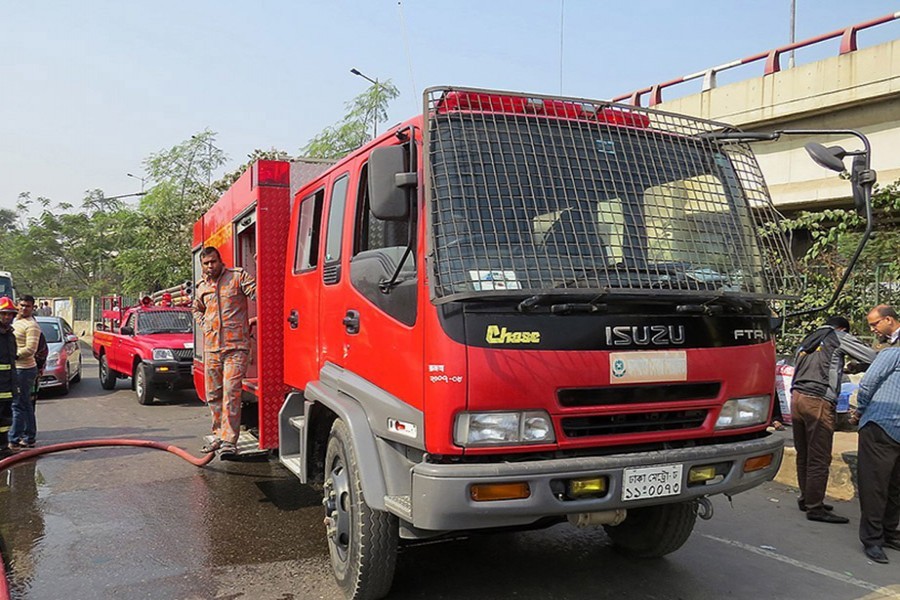
Published :
Updated :

Bangladesh is susceptible to various natural and manmade disasters, including earthquakes, landslides, and fires. In the event of such emergencies, Fire Service and Civil Defense (FSCD) plays a critical role as the first responder, often being the first point of contact for individuals seeking help. It is, however, a matter of grave concern that despite the increasing frequency of various types of emergencies, including a more than twofold increase in fire incidents from 12,182 in 2009 to 26,000 in 2024 largely because of unplanned urbanisation and industrialisation, the capacity of the fire service has not kept pace with the growing need. The FSCD's ability to respond effectively has been called into question during several recent fire incidents, most notably the Secretariat fire, which took no less than 10 hours to extinguish despite being at the nerve centre of the country.
The FSCD operates around 500 stations nationwide, with 112 located in Dhaka. However, as many as 32 upazilas lack fire stations entirely, highlighting yet another instance of developmental imbalance. During the dry season, when fire incidents become more frequent, this inadequacy leaves many regions woefully unprepared to handle emergencies. Numerous fire incidents, both major and minor, have occurred in recent times, with firefighters often arriving only after affected infrastructures were completely gutted.
Statistics on fire outbreaks and their consequences are alarming. According to FSCD data, over 26,000 fire incidents occurred in 2024 alone, resulting in 140 fatalities and injuries to 341 others. Faulty electrical connections including short circuits were identified as the leading causes, accounting for over a third of all fires, underscoring the urgent need for improved electrical infrastructure and safety measures across the country. Restaurant fires have emerged as the deadliest, causing nearly half of all fire-related deaths. Additionally, residential building fires and gas explosions have claimed numerous lives.
These figures stress the importance of fire safety awareness and the implementation of stringent safety measures in residential and commercial buildings. Non-compliance with building codes, overpopulation, and weak infrastructure - particularly gas, electricity, and sewerage lines - significantly increase fire risks. Addressing these challenges requires urgent intervention, as does the expansion and modernisation of the FSCD to build a more capable firefighting force. The shortage of fire stations is compounded by an insufficient workforce. Just 14,000 firefighters serve a population of 180 million.
Despite these constraints, firefighters have demonstrated commendable dedication, preventing even higher casualties. However, their effectiveness is often hampered by the disappearance of water bodies in urban areas, the rapid proliferation of high-rise buildings, and infrastructural barriers such as narrow streets, traffic congestion, and overwhelming numbers of onlookers that obstruct rescue efforts.
Overall, the fire service remains a neglected sector in government planning, despite its crucial role in a densely populated country like Bangladesh. A recent report has highlighted the FSCD's struggle against rising fire incidents, external challenges, and internal shortcomings. One of the most pressing concerns is the lack of advanced and specialised training. Firefighters require skill enhancement through advanced training programmes, and the department must establish dedicated response teams for different types of emergencies, such as high-rise building fires, industrial fires, and hazardous material incidents.
A modern and well-equipped fire service is not a luxury but a necessity. The government must prioritise investments in fire stations, recruit and train more firefighters, and equip them with modern technology. Enforcing fire safety regulations and raising public awareness should also be integral to a fire prevention and safety strategy. Without such measures, the country will continue to suffer preventable losses of life and property.
aktuhin.fexpress@gmail.com


 For all latest news, follow The Financial Express Google News channel.
For all latest news, follow The Financial Express Google News channel.